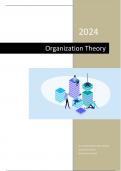09-2023 t/m 02-2024
2024
Organization Theory
Pre-master Business Administration
Universiteit Twente
09-2023 t/m 02-2024
,Inhoud
Lecture 1 What is organization theory? .......................................................................................................... 2
Literature: .................................................................................................................................................... 2
Learnings ..................................................................................................................................................... 2
Additional Theory ........................................................................................................................................ 3
Lecture 2 Modernist organization theory 1: early modernist organization principles ................................... 4
Literature ..................................................................................................................................................... 4
Learnings ..................................................................................................................................................... 4
Lecture 3: Modernist organization theory 2: systems theory and contingency theory .................................. 8
Literature ..................................................................................................................................................... 8
Learnings ..................................................................................................................................................... 8
Lecture 4 Neo-modernist organization theory 1: human relations and culture ........................................... 10
Literature ................................................................................................................................................... 10
Learnings ................................................................................................................................................... 10
Lecture 5 Neo-modernist organization theory 2: riding the new wave ........................................................ 12
Literature ................................................................................................................................................... 12
Learnings ................................................................................................................................................... 12
Lecture 6 Post-modernist organizations 1: new organizational forms ......................................................... 16
Literature ................................................................................................................................................... 16
Learnings ................................................................................................................................................... 16
Lecture 7 Post-modernist organizations 2: network organization and the platform economy .................... 19
Literature ................................................................................................................................................... 19
Learnings ................................................................................................................................................... 19
Lecture 8 Reflective organization theory ...................................................................................................... 22
Literature ................................................................................................................................................... 22
Learnings ................................................................................................................................................... 22
Lecture 9 Critical organization theory ........................................................................................................... 24
Literature ................................................................................................................................................... 24
Learnings ................................................................................................................................................... 24
,Lecture 1 What is organization theory?
Literature:
• McAuley et al. chapter 2
Learnings
1. Organization:
• A collective entity with:
• Organizational environment
• Organizational goals
• Members and/or stakeholders
• Organizational structure
2. Corporative Actor:
An entity, often a corporation or organization, viewed as an active participant with the ability to
influence and engage in various actions within its environment.
3. Individual Actors:
Single persons participating in economic, social, and political activities, influencing globalization
through consumption, labour, entrepreneurship, and cross-border interaction.
4. Collective Actors:
Groups organized around shared interests or goals, such as communities, NGOs, and social
movements, influencing public discourse, advocating for causes, and addressing global
challenges.
5. Instrumental perspective:
Organization as a description for structure, Organization as a description for processes
6. Institution:
Established social structures, norms, or organizations that shape and guide behaviour within a
society, often enduring over time.
7. Social Science Theory:
Systematic frameworks and principles used to understand and explain social phenomena through
empirical research and analysis.
8. Organization Theory:
The study of organizations and their structures, processes, and behaviours, aiming to understand
how they function and evolve.
9. Ontology:
The philosophical study of the nature of being, existence, or reality, exploring fundamental
questions about what entities exist. It is about how we think the world is.
10. Epistemology:
The branch of philosophy concerned with the nature of knowledge, including how it is acquired,
justified, and the limits of understanding. It is about what we think can be discovered about the
world.
11. Positivism:
An approach emphasizing empirical observation, measurement, and the scientific method as the
primary means to gain knowledge and understanding.
, 12. Subjectivism:
A perspective that recognizes the importance of individual perceptions, feelings, and
interpretations in shaping knowledge and reality.
13. Managerialism:
A managerial approach emphasizing the role and authority of managers in organizational
decision-making and control.
14. Analytical Levels:
The different perspectives or scales at which phenomena are examined, ranging from individual
elements to larger systems, providing varied insights into complex issues.
15. Theories as spotlights
The metaphor "theories as spotlights" in organization theory suggests that theories function like
spotlights that illuminate certain aspects of organizational phenomena. Each theory, like a
spotlight, focuses on specific elements, perspectives, or dimensions within organizations,
providing a clearer understanding of those particular aspects. However, just as a spotlight might
cast shadows on other areas, theories may not capture the entirety of organizational complexity.
The metaphor emphasizes the idea that different theories offer unique insights and illuminate
different facets of organizational behaviour, structure, and dynamics.
Additional Theory
1. Perspectives in organization theory
Organization theorists differ in the perspectives they apply. Fundamental differences concern:
• Ontological and epistemological positions
• Positivism and subjectivism
• Managerialism and critical perspectives.





